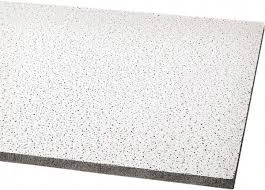10 月 . 05, 2024 13:19 Back to list
difference between gypsum and pvc ceiling
The Difference Between Gypsum and PVC Ceiling Panels
When it comes to interior design and construction, ceiling panels play a crucial role in both aesthetics and functionality. Among the most popular options available are gypsum and PVC ceiling panels. Each material has its unique properties, advantages, and disadvantages, making them suitable for different applications and preferences. This article explores the differences between gypsum and PVC ceiling panels, helping you make an informed decision for your next project.
Composition and Structure
Gypsum ceiling panels are made from a core of gypsum plaster encased in a thin layer of paper or fiberglass. This composition gives gypsum panels a solid, sturdy feel, making them a popular choice for residential and commercial buildings. They come in various sizes and styles, allowing for both standard designs and custom shapes that can enhance any room’s look.
On the other hand, PVC ceiling panels are made from polyvinyl chloride, a type of plastic. These panels are lightweight, flexible, and often available in an array of colors and finishes, including glossy or matte textures. The manufacturing process of PVC allows for detailed patterns and designs, making them highly versatile in interior decoration.
Installation
The installation process for gypsum panels typically requires more time and labor. They need to be fixed to a framework of wooden or metal supports and often require additional finishing steps, such as taping, mudding, and painting. This process can be labor-intensive and may require professional installation for optimal results.
In contrast, PVC ceiling panels are notably easier to install. Their lightweight nature means they can often be fixed directly to existing ceilings without the need for extensive support structures. Moreover, they do not require painting or additional finishing, as they come in pre-finished designs. DIY enthusiasts often prefer PVC panels due to their straightforward installation process.
Durability and Maintenance
When it comes to durability, gypsum panels are fire-resistant, which makes them an excellent choice for safety-conscious homeowners. However, they can be susceptible to moisture and humidity, which may lead to sagging or mold growth if not properly maintained. Regular inspections and potential repairs are needed to keep gypsum ceilings in good condition, especially in areas prone to moisture, like bathrooms and kitchens.
difference between gypsum and pvc ceiling

PVC panels excel in damp environments, as they are water-resistant and do not support mold growth. This makes them ideal for areas where moisture is a concern. Additionally, PVC is resistant to fading and staining, which means it requires less maintenance over time. A simple wipe-down with a damp cloth is usually sufficient to keep PVC ceilings looking fresh and clean.
Aesthetics and Variety
In terms of aesthetics, gypsum ceilings can provide a classic and elegant look, especially when textured or painted. The variety of textures available can give a room a luxurious feel, which is often preferred in high-end residential projects or formal spaces.
On the other hand, PVC panels offer a modern and sleek design. The range of colors and patterns available can cater to various design themes, from contemporary to traditional. The flexibility of PVC also allows for unique ceiling designs, including drop ceilings that can creatively hide wiring and ductwork.
Cost Considerations
In terms of cost, gypsum ceiling panels are generally more affordable in terms of material cost. However, the overall cost can increase significantly when factoring in labor and installation expenses. On the other hand, while PVC panels might have a higher upfront cost, their ease of installation and low maintenance can lead to cost savings in the long run.
Conclusion
In conclusion, both gypsum and PVC ceiling panels have their distinct advantages and disadvantages. Gypsum panels provide a traditional, sturdy option with excellent fire resistance, though they require more maintenance and care in humid areas. PVC panels, with their water resistance, ease of installation, and variety of designs, offer a modern solution ideal for various environments.
Ultimately, the choice between gypsum and PVC ceiling panels depends on individual needs, preferences, and the specific demands of your space. By considering factors such as durability, aesthetics, maintenance, and cost, you can successfully choose the right ceiling solution for your home or project.
-
Revolutionizing Interior Design with Ceilings t grid Suspended SystemNewsOct.29,2024
-
Revolutionizing Ceiling Design with ceiling access panel with Gypsum Tile WaterproofNewsOct.29,2024
-
Revolutionizing Interior Design with PVC Gypsum Ceiling: A Comprehensive GuideNewsOct.29,2024
-
Elevating Interior Design with High quality Mineral Fiber Ceiling TilesNewsOct.29,2024
-
Revolutionizing Interior Design with PVC Gypsum Ceiling: A Comprehensive GuideNewsOct.29,2024
-
Elevating Interior Design with High-Quality Mineral Fiber Ceiling Tiles: A Comprehensive GuideNewsOct.29,2024







